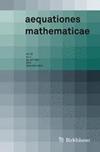通过不变性对二元均值进行多变量概括
IF 0.7
3区 数学
Q2 MATHEMATICS
引用次数: 0
摘要
对于给定的 p 变量均值(M :I^p \rightarrow I\) (I 是 \({\mathbb {R}}\) 的子区间),根据(Horwitz 在 J Math Anal Appl 270(2):499-518, 2002)和(Lawson and Lim in Colloq Math 113(2):191-221, 2008),我们可以定义(在某些假设下)它的(((p+1))-变量((beta)-不变扩展)为唯一解(K :函数方程 $$\begin{aligned}&;K\big (M(x_2,\dots ,x_{p+1}),M(x_1,x_3,\dots ,x_{p+1}),\dots ,M(x_1,\dots ,x_p)\big )\&\quad =K(x_1,\dots ,x_{p+1}), \text { for all }x_1,\dots ,x_{p+1}\in I \end{aligned}$$在均值族中。迭代地应用这一过程,我们可以得到一个均值,该均值定义于从二维向量开始的任意长度的向量。本文旨在研究这种扩展的性质。本文章由计算机程序翻译,如有差异,请以英文原文为准。

Multivariable generalizations of bivariate means via invariance
For a given p-variable mean \(M :I^p \rightarrow I\) (I is a subinterval of \({\mathbb {R}}\)), following (Horwitz in J Math Anal Appl 270(2):499–518, 2002) and (Lawson and Lim in Colloq Math 113(2):191–221, 2008), we can define (under certain assumptions) its \((p+1)\)-variable \(\beta \)-invariant extension as the unique solution \(K :I^{p+1} \rightarrow I\) of the functional equation
$$\begin{aligned}&K\big (M(x_2,\dots ,x_{p+1}),M(x_1,x_3,\dots ,x_{p+1}),\dots ,M(x_1,\dots ,x_p)\big )\\&\quad =K(x_1,\dots ,x_{p+1}), \text { for all }x_1,\dots ,x_{p+1} \in I \end{aligned}$$
in the family of means. Applying this procedure iteratively we can obtain a mean which is defined for vectors of arbitrary lengths starting from the bivariate one. The aim of this paper is to study the properties of such extensions.
求助全文
通过发布文献求助,成功后即可免费获取论文全文。
去求助
来源期刊

Aequationes Mathematicae
MATHEMATICS, APPLIED-MATHEMATICS
CiteScore
1.70
自引率
12.50%
发文量
62
审稿时长
>12 weeks
期刊介绍:
aequationes mathematicae is an international journal of pure and applied mathematics, which emphasizes functional equations, dynamical systems, iteration theory, combinatorics, and geometry. The journal publishes research papers, reports of meetings, and bibliographies. High quality survey articles are an especially welcome feature. In addition, summaries of recent developments and research in the field are published rapidly.
 求助内容:
求助内容: 应助结果提醒方式:
应助结果提醒方式:


